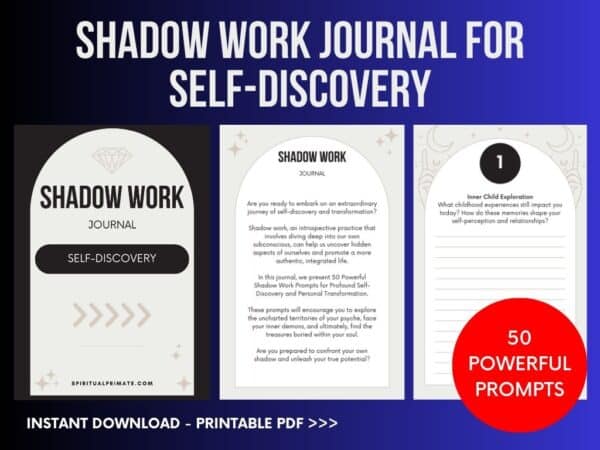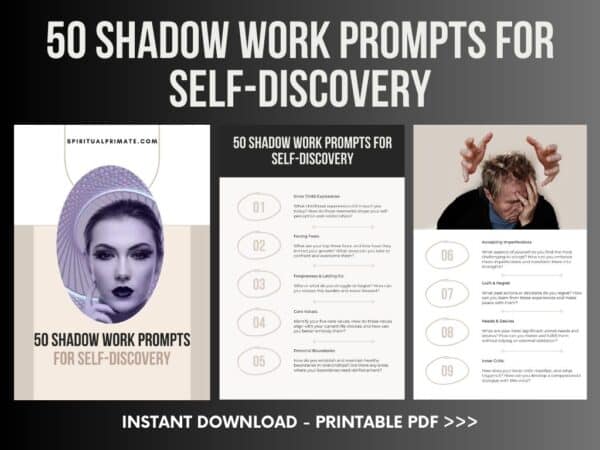Are you ready to embark on an extraordinary journey of self-discovery and transformation? Shadow work, an introspective practice that involves diving deep into our own subconscious, can help us uncover hidden aspects of ourselves and promote a more authentic, integrated life.
In this article, we present “Embrace Your Hidden Depths: 50 Powerful Shadow Work Prompts for Profound Self-Discovery and Personal Transformation.”
These prompts will encourage you to explore the uncharted territories of your psyche, face your inner demons, and ultimately, find the treasures buried within your soul.
Are you prepared to confront your own shadow and unleash your true potential?

Self-Discovery: Understanding the Journey Within
In the fast-paced world we live in, it’s all too easy to become consumed by the demands of everyday life. Amidst the hustle and bustle, we often lose sight of ourselves and who we truly are. This is where the concept of “self-discovery” comes into play. But what exactly does it mean, and why is it so important? In this easy-to-understand guide, we’ll explore the essence of self-discovery and how it can enrich our lives.
At its core, self-discovery is the process of getting to know oneself on a deeper level. It involves delving into our thoughts, emotions, desires, and values to uncover the aspects of our personality that make us unique. This journey of introspection enables us to develop a clearer understanding of our strengths, weaknesses, and overall sense of self. By doing so, we can identify areas for growth, set meaningful goals, and ultimately, lead a more fulfilling life.
Self-discovery is essential for personal growth because it allows us to recognize the areas in our lives that require improvement. By understanding ourselves better, we can develop healthier relationships, make better decisions, and cultivate a strong sense of purpose. Furthermore, the journey of self-discovery is ongoing, as we continuously evolve and adapt to new experiences. As a result, regular self-reflection is crucial to maintaining a deeper connection with ourselves.
One of the most significant benefits of self-discovery is the ability to develop self-awareness. This heightened state of consciousness enables us to recognize our emotions, thoughts, and actions in real-time, allowing us to respond to situations more effectively. Self-aware individuals are more in tune with their needs and values, which makes it easier for them to set boundaries, express themselves, and make decisions that align with their goals.
In conclusion, self-discovery is a vital component of personal growth and well-being. By embarking on this journey, we can unlock our full potential, develop a deeper understanding of ourselves, and create a life that is more authentic and fulfilling. So, the next time you find yourself feeling lost or disconnected, consider taking a step back and asking yourself: “What can I learn about myself today?”

Shadow Work: A Powerful Tool for Self-Discovery
Shadow work is a psychological concept that was first introduced by the Swiss psychiatrist Carl Gustav Jung. It involves exploring the darker aspects of our personality, often referred to as the “shadow self.” This shadow self consists of the traits and emotions that we have suppressed or rejected due to societal norms, personal fears, or past experiences. By acknowledging and integrating these hidden aspects into our conscious awareness, we can achieve a deeper understanding of ourselves and enhance our journey of self-discovery.
The Importance of Shadow Work
1. Uncovering Hidden Strengths and Weaknesses
By embracing our shadow self, we can acknowledge the strengths and weaknesses that were previously hidden from our conscious awareness. This newfound knowledge allows us to capitalize on our unique qualities and work towards improving the areas that require growth. In turn, this leads to a more balanced and authentic self.
2. Healing Past Traumas
Many of our suppressed emotions and behaviors are rooted in past traumas and experiences. Shadow work encourages us to confront these unresolved issues, allowing for the release of emotional pain and the healing of our inner wounds. This process not only contributes to personal growth but also enhances our emotional well-being.
3. Developing Self-Acceptance and Compassion
As we delve into our shadow self, we learn to accept and embrace the parts of ourselves that we previously rejected. This practice of self-acceptance fosters a sense of compassion not only towards ourselves but also towards others, as we begin to understand that everyone has their own hidden struggles and imperfections.
4. Enhancing Relationships and Communication
Shadow work helps us to recognize and understand the unconscious patterns and behaviors that influence our interactions with others. By bringing these patterns to light, we can work on improving our communication skills, develop healthier relationships, and reduce conflicts in our personal and professional lives.
Techniques for Shadow Work
1. Journaling
Writing down your thoughts and feelings can be a powerful tool for self-reflection and exploration. By journaling regularly, you can identify patterns and themes within your emotions and behaviors, allowing you to uncover and address your shadow aspects.
2. Meditation and Mindfulness
Practicing meditation and mindfulness helps you to become more aware of your thoughts and emotions. This awareness allows you to observe your shadow self without judgment and cultivate a deeper understanding of your inner world.
3. Seeking Professional Help
Engaging with a qualified therapist or counselor can provide valuable guidance and support as you navigate the process of shadow work. These professionals are trained to help you identify, explore, and integrate your shadow self in a safe and structured environment.
4. Art and Creative Expression
Artistic pursuits, such as painting, drawing, or writing, can be a powerful way to explore and express your shadow self. Through creative expression, you can give voice to the hidden aspects of your personality and begin to integrate them into your conscious awareness.
Shadow work is a crucial component of self-discovery, as it encourages us to confront and integrate the hidden aspects of our personality. By embracing our shadow self, we can develop a more profound understanding of our strengths and weaknesses, heal past traumas, and cultivate self-acceptance and compassion. Ultimately, shadow work allows us to achieve personal growth and lead a more balanced, authentic, and fulfilling life.

Shadow Work Prompts for Self-Discovery
1. Inner Child Exploration: What childhood experiences still impact you today? How do these memories shape your self-perception and relationships?
2. Facing Fears: What are your top three fears, and how have they limited your growth? What steps can you take to confront and overcome them?
3. Forgiveness & Letting Go: Who or what do you struggle to forgive? How can you release this burden and move forward?
4. Core Values: Identify your five core values. How do these values align with your current life choices, and how can you better embody them?
5. Personal Boundaries: How do you establish and maintain healthy boundaries in relationships? Are there any areas where your boundaries need reinforcement?
6. Accepting Imperfections: What aspects of yourself do you find the most challenging to accept? How can you embrace these imperfections and transform them into strengths?
7. Guilt & Regret: What past actions or decisions do you regret? How can you learn from these experiences and make peace with them?
8. Needs & Desires: What are your most significant unmet needs and desires? How can you honor and fulfill them without relying on external validation?
9. Inner Critic: How does your inner critic manifest, and what triggers it? How can you develop a compassionate dialogue with this voice?
10. Shadow Archetypes: Identify your dominant shadow archetypes (e.g., the victim, the saboteur). How do they influence your thoughts and behaviors, and how can you integrate these aspects of yourself?
11. Repressed Emotions: What emotions are you most uncomfortable expressing? How can you safely explore and release these feelings?
12. Projection & Ownership: In what situations do you project your unresolved issues onto others? How can you take responsibility for these projections and work through them?
13. Control & Surrender: In which areas of your life do you exert excessive control, and where might you benefit from surrendering? How can you find balance and trust the process?
14. Unconscious Beliefs: What limiting beliefs do you hold about yourself, others, or the world? How can you challenge and transform these beliefs?
15. Personal Mythology: What stories and narratives have you created about your life experiences? How can you rewrite these stories to empower and uplift you?
16. Intuition & Inner Wisdom: How do you tap into your intuition and inner guidance? Are there any areas where your intuition is being ignored or suppressed?
17. Embracing Change: How do you react to change, and what fears or resistance do you have around it? How can you become more adaptable and open to life’s inevitable shifts?
18. Gratitude & Appreciation: What aspects of your life do you take for granted? How can you cultivate a deeper sense of gratitude and appreciation?
19. Inner Peace: What does inner peace mean to you, and how can you cultivate it? Are there any habits or practices that disrupt your sense of calm?
20. Authenticity & Vulnerability: How do you show up authentically in your relationships and interactions? What barriers prevent you from being vulnerable with others?
21. Self-Care & Nurturing: How do you prioritize self-care and nurture yourself? Are there any areas where you might be neglecting your well-being?
22. Inner Strengths & Resources: What inner resources and strengths do you possess that can support your personal growth? How can you harness these qualities more effectively?
23. Attachment & Detachment: In what areas of your life do you struggle with attachment or detachment? How can you find balance and cultivate a healthier perspective?
24. Healing Old Wounds: What past traumas or wounds still require healing? How can you create a safe space for yourself to process and heal these experiences?
25. Life Purpose & Passion: What is your life’s purpose, and how does it align with your passions? How can you take steps to pursue this purpose more intentionally?
26. Self-Trust & Confidence: How do you build trust in yourself and your abilities? What areas of your life could benefit from greater self-confidence?
27. Responsibility & Accountability: How do you take responsibility for your actions and hold yourself accountable? Are there any areas where you might be shirking responsibility?
28. Growth & Expansion: How do you actively pursue personal growth and self-improvement? What new experiences or challenges can you embrace to expand your horizons?
29. Self-Expression & Creativity: How do you express yourself creatively and authentically? Are there any areas where your self-expression is stifled or limited?
30. Emotional Intelligence: How do you develop emotional intelligence and empathy? How can you better understand and navigate your own emotions and those of others?
31. Self-Reflection & Introspection: How do you engage in self-reflection and introspection? What practices or tools do you use to gain deeper insights into yourself?
32. Relationship Patterns: What patterns do you notice in your relationships, and how do they relate to your shadow aspects? How can you break free from unhealthy dynamics?
33. Judgment & Acceptance: How do you judge yourself and others? How can you cultivate greater acceptance and compassion in your interactions?
34. Mindfulness & Presence: How do you practice mindfulness and remain present in your daily life? Are there any areas where your attention tends to wander or become distracted?
35. Spiritual Connection: How do you connect with your spiritual beliefs or a higher power? How can you deepen this connection and integrate it into your daily life?
36. Surrendering Expectations: How do you manage expectations in your relationships and personal pursuits? How can you surrender these expectations and allow things to unfold naturally?
37. Personal Rituals & Routines: What personal rituals or routines help ground and center you? How can you create new rituals to support your emotional well-being?
38. Shadow Integration: How can you embrace and integrate your shadow aspects to create a more balanced and authentic self?
39. Unconscious Patterns: What unconscious patterns have you inherited from your family or upbringing? How can you recognize and break these cycles?
40. Embracing Uncertainty: How do you cope with uncertainty and the unknown? How can you develop greater trust and resilience in the face of life’s unpredictability?
41. Self-Sabotage: In what ways do you engage in self-sabotaging behaviors? How can you address these patterns and create more supportive habits?
42. Cultivating Joy: How do you bring joy and happiness into your life? Are there any areas where your joy is being suppressed or overshadowed?
43. Personal Power: How do you assert your personal power and stand up for yourself? Are there any situations where you give away your power to others?
44. Healthy Communication: How do you communicate your needs, boundaries, and emotions in a healthy, assertive manner? Are there any areas where your communication skills could be improved?
45. Building Resilience: How do you bounce back from setbacks or hardships? What strategies do you use to cultivate resilience and perseverance?
46. Honoring Your Body: How do you honor and care for your physical body? Are there any areas where you might be neglecting your physical well-being?
47. Breaking Free from Comparison: How do you free yourself from the trap of comparison? How can you celebrate your uniqueness and embrace your individuality?
48. Facing Rejection: How do you cope with rejection and disappointment? What strategies do you use to maintain your self-worth and confidence in these situations?
49. Finding Balance: How do you maintain balance in your personal and professional life? Are there any areas where you might be overextending yourself or neglecting your needs?
50. Cultivating Compassion: How do you practice compassion and empathy for yourself and others? Are there any areas where you could be more compassionate or understanding?
As we conclude this transformative exploration of the 50 shadow work prompts, it’s essential to remember that the journey of self-discovery and personal growth is a continuous process. The more we engage with our shadow selves, the more we can integrate those hidden aspects into our consciousness, leading to a more authentic, harmonious life.
By embracing our hidden depths, we can foster profound self-awareness and personal transformation. So, as you continue on this path of self-reflection and growth, we leave you with one final question:
How will you harness the power of your shadow to create an even more fulfilling and vibrant life?
Dive Deeper Into Your Shadow Work Journey
- Product on sale
 Printable Shadow Work Journal for Self-Discovery and Personal Transformation [PDF]Original price was: $11.98.$5.99Current price is: $5.99.
Printable Shadow Work Journal for Self-Discovery and Personal Transformation [PDF]Original price was: $11.98.$5.99Current price is: $5.99. - Product on sale
 50 Shadow Work Prompts for Self-Discovery | Printable PDFOriginal price was: $5.98.$2.99Current price is: $2.99.
50 Shadow Work Prompts for Self-Discovery | Printable PDFOriginal price was: $5.98.$2.99Current price is: $2.99.

